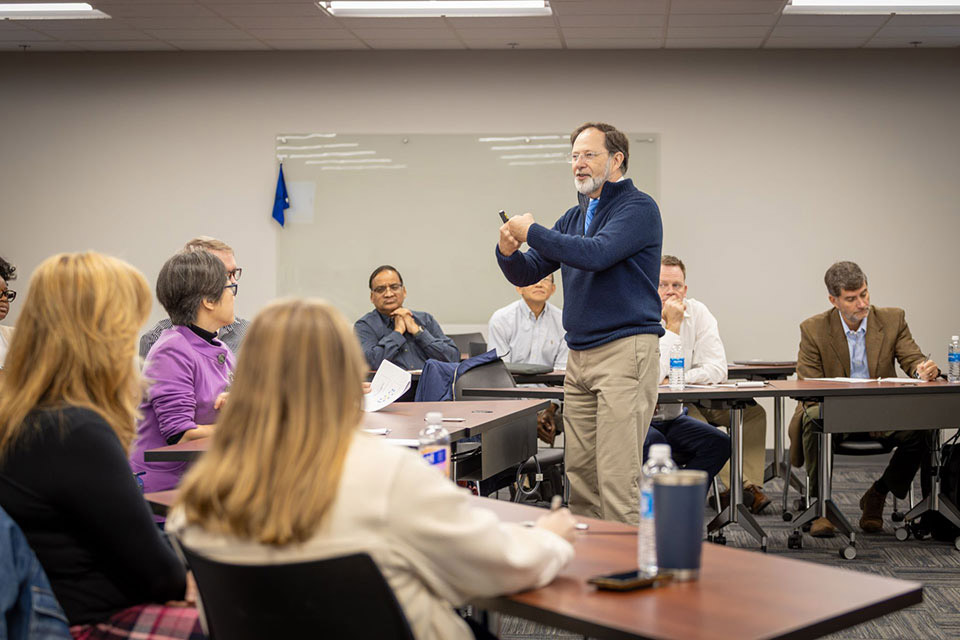Leading Change from the Middle Workshop Is February 14
The Emerson Leadership Institute at Chaifetz School of Business launched the Dignity-Based Leadership Development Series for the 2024-2025 academic year in the Fall of 2024.
This year-long leadership program consists of a series of in-person retreats featuring leadership speakers, symposiums, panels, and interactive workshops carefully designed to allow participants to discover their leadership potential, cultivate their leadership skills, build a cohesive, high-performing team, and create a culture of dignity and belonging.
The Dignity-Based Leadership Development Series continues with a professional development workshop on Leading Change from the Middle – A Dignity-Based Approach to be held Friday, Feb. 14, in room L30 of Cook Hall.
Leading Change from the Middle – A Dignity-Based Approach
Fear. Frustration. Anger. These and other emotions often are engendered whenever organizational leaders announce the newest change initiative and ask for buy-in. The emotions flow from being excluded from the discussion and decision. Such changes are often not a choice for employees, who typically expect little benefit and potentially substantial loss from the change.
Decade after decade, research reports that such change initiatives fail to achieve desired goals 60% to 90% of the time. These statistics explain why successfully leading change is the test of leadership: mainly because failure is the norm. How leaders engage their communities to greatly increase the success of leading change?
Leading Change from the Middle offers a dignity-based methodology that delivers results and builds a positive and collaborative organizational culture. In essence, mastery of this methodology can transform leadership ability. This program explores how most change methodologies implicitly assume that a change leader is at the apex of an organization with attendant resources and decision rights.
Yet, most change initiatives are driven by mid-level leaders who don’t have the full range of resources and authorities needed to direct the desired changes, a situation especially common in university settings. Without a method designed for the middle, cajoling, directing, and pushing often are default strategies and they accomplish little except to build resistance and trigger push back.
In this session participants will learn about three elements that comprise the methodology called Leading at the Crossroads of Change.
The first element focuses on discovering all relevant stakeholders. These stakeholders are categorized into one of four groupings with no stakeholder allowed to be in more than one group.
These categories then become the central focus of the second element that offers a set of Communications, Strategies, Tactics, and the Sequencing (referred to at CoSTS). The CoSTS are designed to gain agreement and commitment of those directly involved in the change initiative, create sufficient value for those effected by the change, and gain the support of those who could derail the initiative.
The third element recognizes that those who feel disrespected, envy, anger, or fear will not support the change initiative and may even actively work to arrest its progress. Therefore, Leading at the Crossroads of Change offers specific ways to build and maintain relationships and avoid triggering these emotions.
Mastery of Leading at the Crossroads of Change can help every leader transform their chances of passing the test of leadership.
Workshop Information
- Date & Time: 9 a.m. to 1:30 p.m. on Friday, Feb. 14, 2025
- Program: 9 a.m. to 12:30 p.m., workshop. 12:30 p.m. to 1:30, lunch and social hour
- Venue: L30, Chaifetz School of Business lower level, 3674 Lindell Blvd
- Presenter: Jackson Nickerson, Ph.D., Edward Jones Dean of the Chaifetz School of Business. Nickerson is a distinguished and internationally renowned scholar, professor, and consulting strategist. Prior to joining SLU’s Chaifetz School of Business, Nickerson was the Frahm Family Professor of Organization and Strategy (Emeritus) in Olin Business School at Washington University in St. Louis. He also was the Associate Dean and Director of Brookings Executive Education from 2009-2017, was a non-resident Senior Fellow in Governance Studies at the Brookings Institution from 2010-2020, and is a Fellow of the Strategic Management Society.
For questions about this Leadership Development Series, contact the Director of the Emerson Leadership Institute, Jintong Tang, Ph.D. at jintong.tang@slu.edu.


















